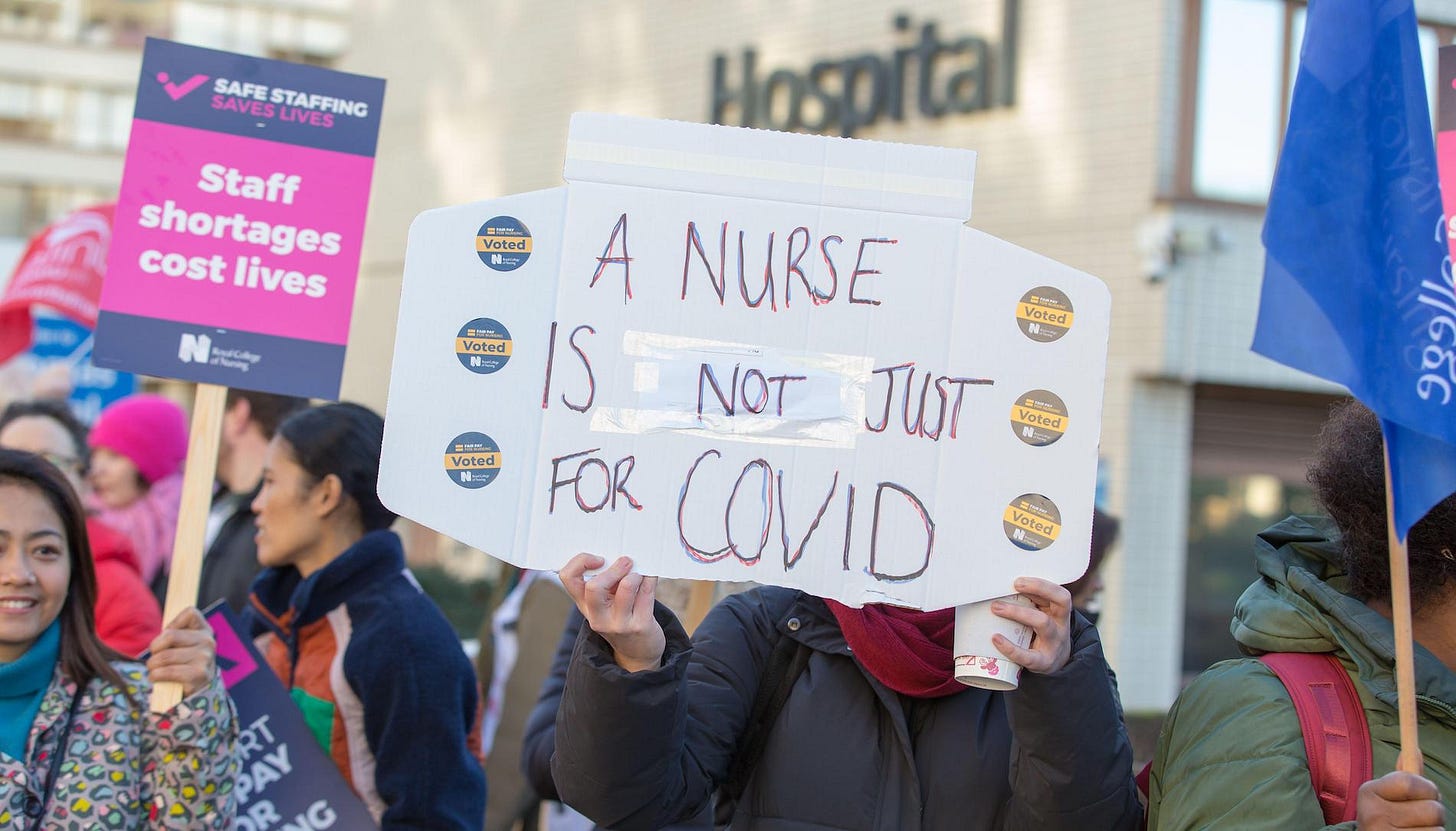Public Believes Conservative Party Has Secret Plan to Sell Off the NHS
EXCLUSIVE: Poll finds voters fear Rishi Sunak wants to end universal healthcare. Plus the Byline Podcast investigates the crisis in the NHS
A majority of British people believe the Conservative party wants to sell off the NHS and introduce charges to use its services, according to an exclusive new poll commissioned by the Byline Supplement.
Rishi Sunak insisted this week that he is committed to the principle of a universal National Health Service, that is free at the point of use.
However, a new poll conducted by pollsters Omnisis, suggests that most voters do not believe him.
Omnisis’ found that 61% of all voters believe the Conservatives would like to introduce new charges for certain NHS services, while 51% believe they wish to entirely privatise the service.
By contrast, just one-in-five voters do not believe that Sunak’s party would like to privatise the NHS, with only 14% saying the party does not want to introduce charges to use it.
The findings come as senior Conservative politicians and publications call for the Prime Minister to dismantle the NHS in its current form.
Former Conservative Chancellor Ken Clarke this week called for new charges to be introduced for patients to access their GPs.
Asked about the proposal this week, a spokesman for the Prime Minister did not rule it out, but insisted that he was “not aware” of any “current” plans to introduce charges.
Half a dozen members of Sunak’s Government, including the Chancellor Jeremy Hunt, have previously called for the NHS to be dismantled, the Byline Times revealed this week.
Both Hunt and the Levelling-Up Secretary Michael Gove were among the authors of a book published in 2005 suggesting that the NHS model was no longer “relevant” and should be brought to an end.
Today’s poll comes after Sunak gave into longstanding demands for him to confirm whether he uses private healthcare.
Until this week Downing Street had insisted that it was not in the “public interest” to reveal whether the Prime Minister pays to opt out of the NHS, following reports that he was registered at a private GP charging £250 for an appointment.
However, Sunak used his appearance at Prime Minister’s Questions on Wednesday to confirm that he had in fact used private healthcare “in the past”. His press secretary declined to say whether he had used private healthcare while Prime Minister.
BYLINE PODCAST: NHS IN CRISIS
The latest Byline Times Podcast – available as an exclusive preview via Substack – explores the crisis in the NHS in crisis and the factors which lie behind it.
We’ve got a Health Service which (in England at least) is riven by industrial disputes, involving nurses and ambulance drivers - with action pending by junior doctors.
Ambulance response times are the worst on record; more than half of patients attending A&E departments are waiting four hours or more to be seen – another historical low – and although waiting lists for routine surgery have improved slightly, they are still the second worst on record.
Byline Times has been covering the crisis in detail and host Adrian Goldberg hears from our Investigations Editor Sam Bright and David Oliver, an NHS consultant.
LISTEN TO THE BYLINE PODCAST HERE
Produced in Birmingham by Adrian Goldberg and Harvey White.
So do you believe the NHS recover from this crisis, and does the Government have secret plans to dismantle it in its current form? Join the debate below.




It's pretty obvious that they wish to marketise health care. They may keep the 'brand' or facade of our crumbling NHS. But it's a long held desire of the Conservative Party to dismantle it.
I was told in 1984 that the then level of NIC’s were insufficient to fund future generational needs in either pensions or healthcare and that we would need private provision - at least as far as pensions are concerned. Today, we see NHS services shored up by ‘add on’ services from the private sector but with which data isn’t shared. It’s massively inefficient, predicated on outdated laws that are woolly at best. If we need (as seems true) privately provided services (absent of direct investment) then a quick win would be to demolish the so called Chinese Walls surrounding data. As for creeping privatisation, we’ll, maybe for some services. But how would this work if everything becomes part of the private sector? What happens to NICs? Would there be relief for private contributions? Would it actually make any difference? How would such a move impact the poorest in our society? What about emphasising preventative medicine? These are huge questions for which I’ve yet to hear coherent answers. One thing is for sure; emulating the US system is a recipe for increased inequality and the potential for late life bankruptcy.